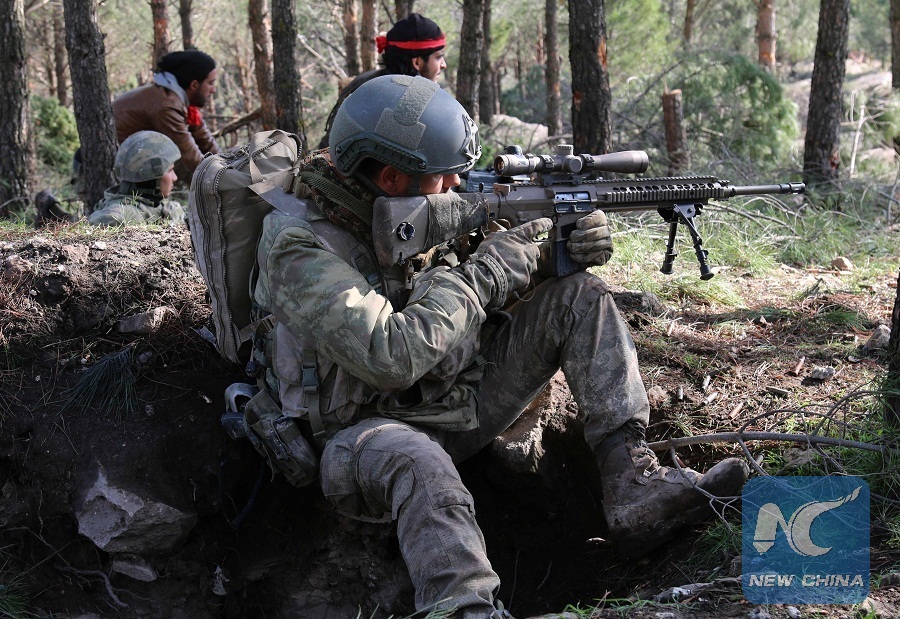
A Turkish special forces soldier takes aim on a mountain on the Syrian-Turkish border, north of Azaz on January 28, 2018. (AFP Photo)
ANKARA, Feb. 28 (Xinhua) -- Turkey has sent hundreds of police and gendarmerie special forces to northern Syria, signaling a new stage in its major offensive against the Kurdish militia as urban fighting looms.
Turkey's latest military deployment is aimed at creating a safe zone along its border with Syria.
Turkish forces and their Syrian rebel allies have launched an air-ground campaign dubbed Operation Olive Branch into the Afrin region in Syria since Jan. 20. It aims to clear the Turkish border of the People's Protection Units (YPG), regarded by Ankara as the Syrian affiliate of the banned Kurdistan Workers' Party (PKK).
"The special forces is in preparation for the new battle that is approaching," Turkish Deputy Prime Minister Bekir Bozdag told NTV news channel.
"The fight will shift to places where there are civilians, as the zone of fighting narrows," he said, adding that the special forces units have experience in fighting militants in residential areas.
Gendarmerie and police special forces would take part in urban fighting and holding villages which Turkish forces have already seized, defying international warnings.
Most of the larger towns in Afrin region, including the town of Afrin itself, remain under YPG control and the advance of Turkish troops could lead to some urban clashes, said observers.
"A new stage of the fight is looming because, after having captured small villages, there are bigger and more populated settlements on the way of the soldiers now," said political commentator and Hurriyet daily columnist Deniz Zeyrek.
TURKEY FORMS "CRESCENT" IN SYRIA
Turkish state media also confirmed that the Turkish army took control of the outer edge of Syria's Afrin region, creating thus a de facto safe border zone and a "crescent" of control on Syria's side of the border.
While Turkish troops are progressing in Syria in an open-ended incursion, Turkey said that Saturday's UN Security Council demand for a 30-day truce across Syria does not apply to its offensive in Afrin.
"Some regions such as eastern Ghouta are part of the UN cease-fire decision in Syria, but Afrin is not one of them," said Bozdag, who is also the government spokesman.
The cease-fire does not apply to military operations against Islamic State (IS), al-Qaida and groups associated with them or other groups designated as terrorist organizations by the Security Council.
But French President Emmanuel Macron, in a phone conversation with his Turkish counterpart Recep Tayyip Erdogan on Monday, insisted that the Turkish operation should fall within the realms of the UN decision.
Turkey regards the YPG as an extension of the PKK which has waged a three-decade-old insurgency in the southeast of Turkey. The PKK is listed as terror group by the United States and European Union, but the YPG is Washington's main ally in the fight against IS in northeast Syria.
Washington's military support to the YPG has severally strained the relations between Turkey and the United States.
The two sides decided during Secretary of State Rex Tillerson's crucial visit to Ankara to normalize ties and create tension diffusing mechanisms.
TURKEY COULD REFRAIN FROM ENTERING AFRIN
Some experts, however, argued that Turkey will eventually have to yield to international pressure and refrain from entering the town of Afrin.
Kerim Has, a Turkish academic who lectures at Moscow State Academy, said neither Russia nor the U.S. wishes the Turkish operation turns into an urban warfare.
Russia, a major player and military supporter to the Syrian regime, will tolerate only for some time the Turkish military near Afrin town, Has said.
"Russia will then push Ankara and Damascus towards dialogue and a deal," Has said, noting that Moscow gave a green light to the Turkish offensive solely in order to establish first a rapprochement between Ankara and Damascus, and then a reconciliation, in line with Moscow's policy to prevent Ankara falling on Washington's side in the Syrian crisis.
Turke severed all cordial ties with the Syrian regime at the beginning of the civil war in Syria and was adamant in ousting Syrian President Bashar al-Assad.
But for the moment the Turkish operation has raised tensions between Ankara and Damascus. The Syrian government has condemned the operation as a violation of the country's sovereignty and sent militia to Afrin to reinforce the Kurds in their resistance against Turkish troops.
The reports were disputed by Ankara, which said the pro-government forces were prevented from entering the region.
Erdogan has signaled that the Turkish operation would last for months, though it was initially supposed to last for only a few weeks.
He also repeated that the siege of Afrin's town center was imminent in front of a crowd of his supporters hailing Turkish troops advance.
"We are on the eve of a new resurrection," said Erdogan during a rally in the southeastern city of Kahramanmaras.
To help the Turkish forces, a 600-strong Kurdish force trained by the army in Turkey, the Kurdish Falcons, has also been deployed in the Afrin region under the leadership of the Turkey-backed Syrian Rebels.
Apart from valuable military engagement, the Kurdish unit would also provide language assistance in the event of an urban assault, according to warfare specialists.
Turkish officials have vehemently rejected concerns over civilian casualties voiced mostly by the YPG, claiming that utmost care is being taken to prevent collateral damage.

